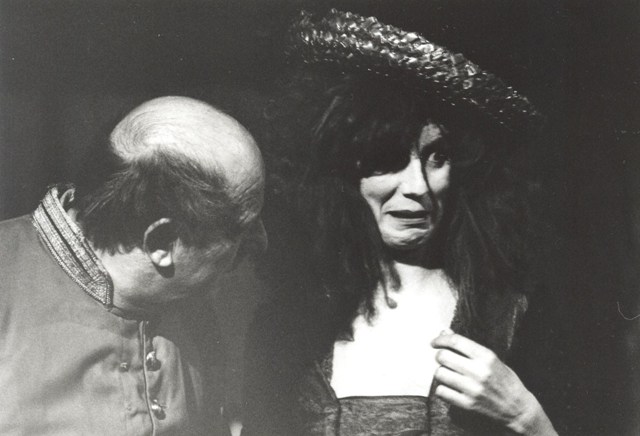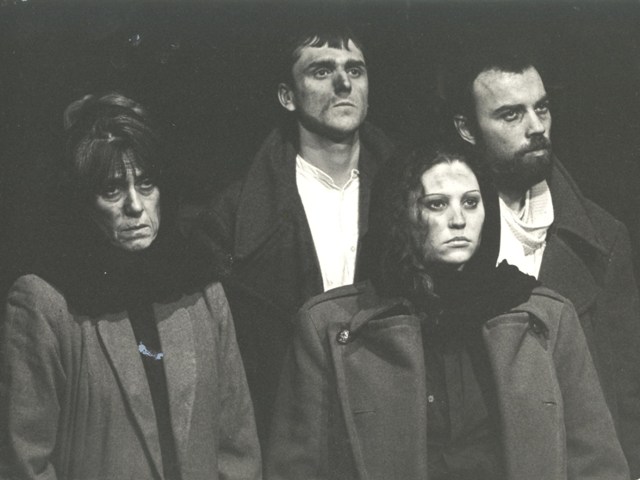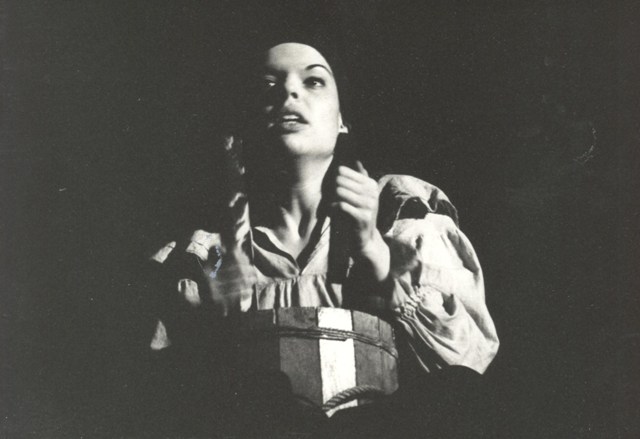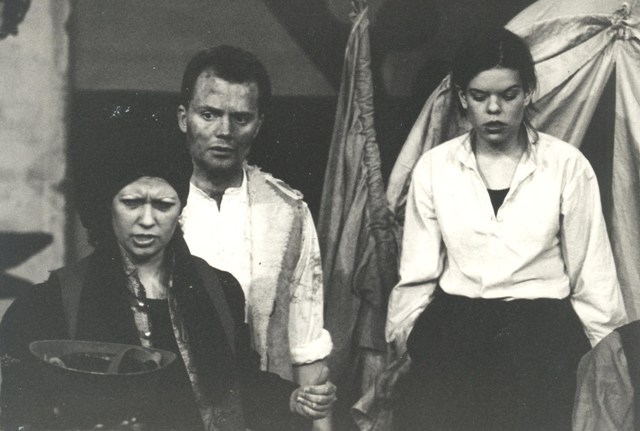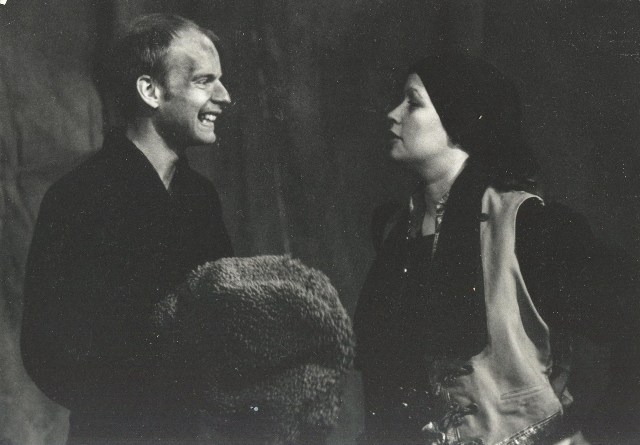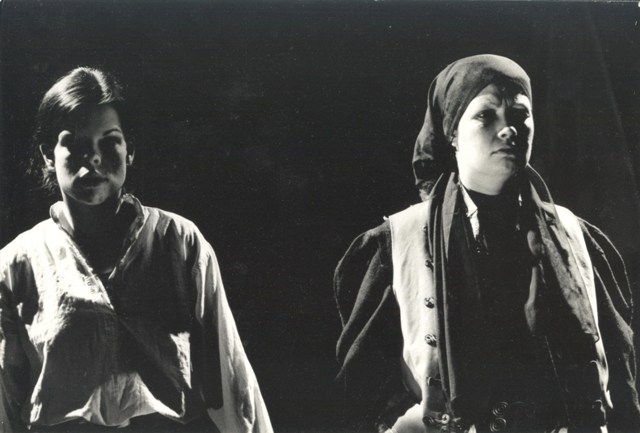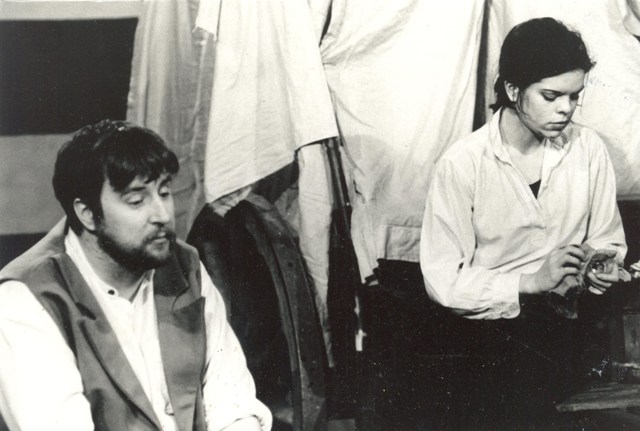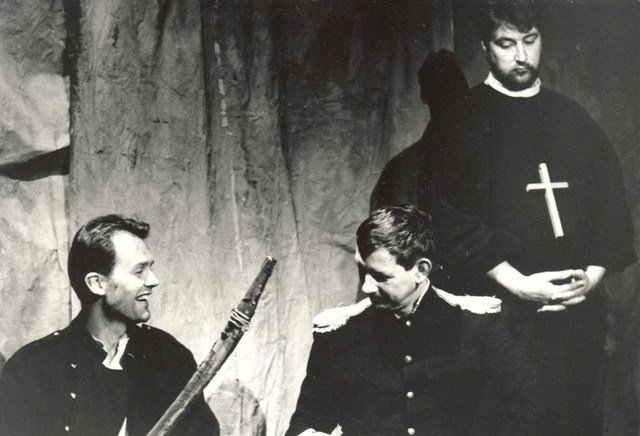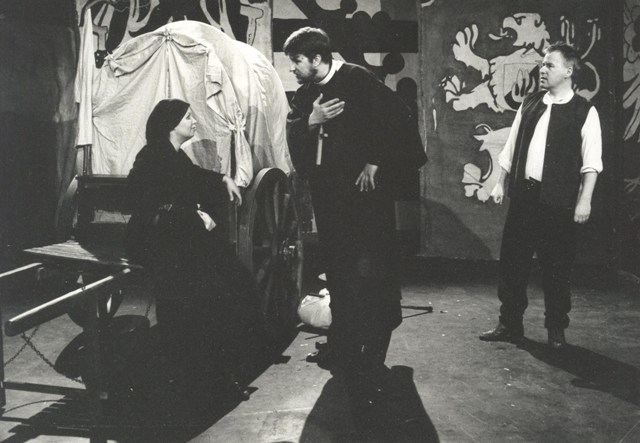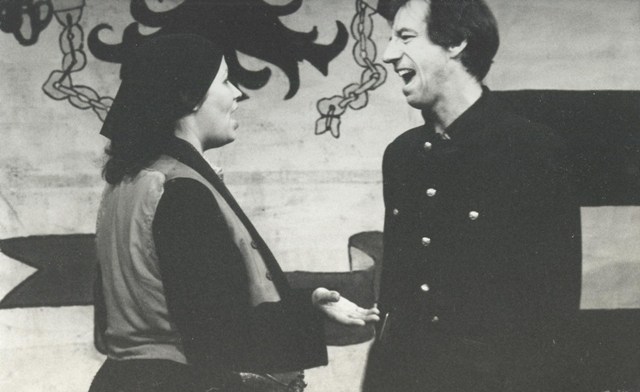The Bench Production
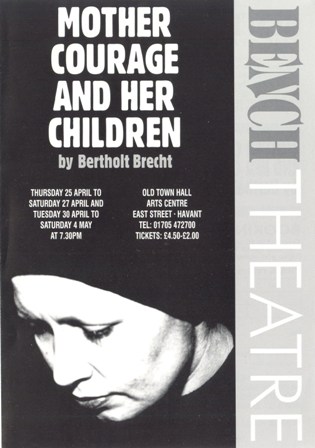
This play was staged at Havant Arts Centre, East Street Havant - Bench Theatre's home since 1977.
Characters
| Guitarist | Rob Finn |
| Recruiter | Andrew Caple |
| Sergeant | Pete Woodward |
| Anna Fierling, Mother Courage | Deb Money |
| Kattrin | Nikki Robinson |
| Eilif | Nick Ashton |
| Swiss Cheese | Neil Pugmire |
| The Cook | Andrew Rees |
| The General | John Blackmore |
| The Chaplain | Tom Kennar |
| The Armourer | Tim Taylor |
| Yvette Pottier | Sally Hartley |
| Soldier | Nigel Baldwin |
| The Man with a Patch | John Blackmore |
| Second Sergeant | Pete Woodward |
| Ancient Colonel | John Batstone |
| Regimental Clerk | Nigel Baldwin |
| Angry Soldier | Tim Taylor |
| Calmer Soldier | Andrew Caple |
| Soldier in a fur coat | Tim Taylor |
| Second Soldier | Andrew Caple |
| Peasant Women | Sue Finn, Becky Dear |
| Peasant Man | Pete Woodward |
| Soldiers at the Bar | John Blackmore, Andrew Caple Tim Taylor, Pete Woodward |
| Professional Ladies | Sue Finn, Becky Dear |
| Peasant | Tim Taylor |
| Peasant Woman | Rosemary Sawyer |
| Guards | Andrew Caple, John Blackmore |
| Ensign | Andrew Caple |
| Soldiers | Nigel Baldwin, John Blackmore |
| Peasant Woman | Rosemary Sawyer |
| Peasant | Pete Woodward |
| Peasant Son | Tim Taylor |
Crew
| Director | Damon Wakelin |
| Musical Director | Tom Kennar |
| Stage Manager | Jenny Evans |
| Assistant Stage Managers | Rosemary Sawyer, Barbara Szulerecki |
| Lighting Design | Steve Wilkins |
| Music Composed by | Tom Kennar and Rob Finn |
| Rehearsal Photography | Tim Taylor |
| Production Photography | John Plimmer |
| Publicity | John O'Hanlon, Kathy O'Hanlon and Leonie Harrington |
| Cart design and construction | Tim Taylor |
| Handbill designed by | Pete Woodward |
| Flags designed and created by | Students of South Downs College |
Director's Notes
What have I done? Mother Courage is a mammoth undertaking, but Brecht is a favourite playwright of mine and Courage a favourite play. But where does one start?
With definitions. Brecht's great theories of alienation cast an enormous shadow across his work; a shadow that cannot be ignored. Brecht himself felt that the theatre had, for too long, been a place of entertainment only. he believed that the theatre should be a place of education too. In the new "scientific age", Brecht sought what he called a "scientific audience"; that is to say a rational dispassionate and analytical audience; to entertain this audience would be to challenge them.
To do this he used "A-effects" - alienation, to make the familiar unfamiliar. For all the originality of this new approach, many of its components were borrowed (as were many of his plots!) from ancient and disparate sources. The story tellers and chorus from Greek theatre; the painted faces, masks and symbolism of Chinese theatre; the overlapping and "epic" historical narratives of Shakespeare and the removal of the fourth wall. Mother Courage uses all of these techniques bar the painted faces and masks.
Thence to the effect these techniques are intended to achieved. In order to aid the rational analysis of the playwrights message, Brecht wanted to remove empathy - both on the part of the players and the audience. the actors were not to "play" but merely represent their characters and the audience was not to become so emotionally involved with the characters that they lost sight of the author's intent. A good theory. A very difficult practice.
I would call myself a "death-bed Brechtian". Towards the end of his life, Brecht began to re-evaluate his stance on empathy. To my mind, an audience's empathy is essential. If an audience does not care for the characters in a play, then they certainly will not care for the author's intent, no matter how worthy. Brecht was also his own worst enemy; some of his characters simply demand our empathy, they are just so well written.
And so, in Mother Courage, my aim is that Kattrin's death in scene eleven (very Brechtian - giving away the ending) be the emotional and dramatic climax of the play, allowing the audience the emotional buffer of scene twelve to absorb and interpret Brecht's final image; Mother Courage, raw from her daughter's death, an abject pitiful creature trailing in the wake of a war that has ravaged her but that she still depends upon for her existence.
Since Brecht's death in 1956, many of his theatrical devices have become standard tools of the trade for dramatists the world over, writers and directors alike. Brecht casts his shadow over more than his own work.
The enormity of this project has been greatly reduced by the support received from those about me. Special thanks to the indefatigable Tim Taylor - chauffeur, cart builder and Guinness drinker; to Debbie Money who has endured an extremely taxing rehearsal schedule with indomitable good cheer and enthusiasm; to Tom Kennar and Rob Finn, the YMCA mafia who, having written the music they virtually re-wrote it to suit the "requirements" of the cast and happily nurtured the confidence of an essentially non-singing company; to Steve Wilkins for his technical expertise and good company. And thanks to the whole cast and crew for their efforts and their invaluable input and support throughout.
So what have I done? The best I can. Enjoy the show.
Damon Wakelin
Reviews
The NewsAvril Stephens
Braving hardships of war
The hardships of war come to Havant in Brecht's play Mother Courage and her Children. The tragic figure of Mother Courage, who loses her three children in the 30-year war, struggles to keep her cart and business on track.
It becomes a bit of a battle sitting through a production of nearly three hours, with the Bench Theatre soldiering through its songs. But superb performances by Sally Hartley as the flighty but faithful prostitute and Tom Kennar as the chaplain won the day. Andrew Rees was impressive as the cocky cook and Neil Pugmire played the part of a simple but honest juvenile with sufficient jitteriness.
The News, 26th April 1996
